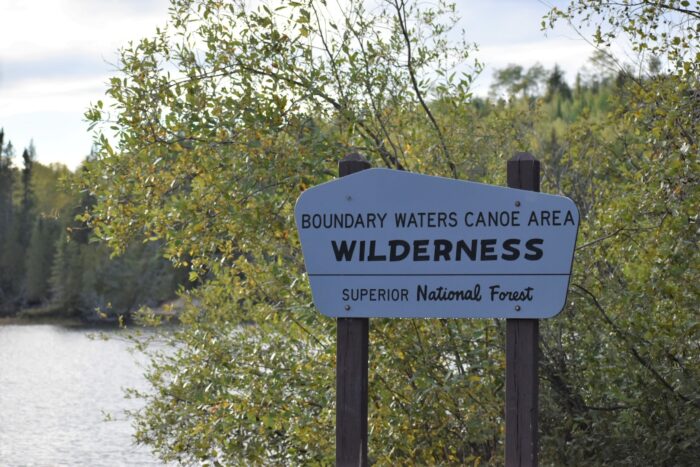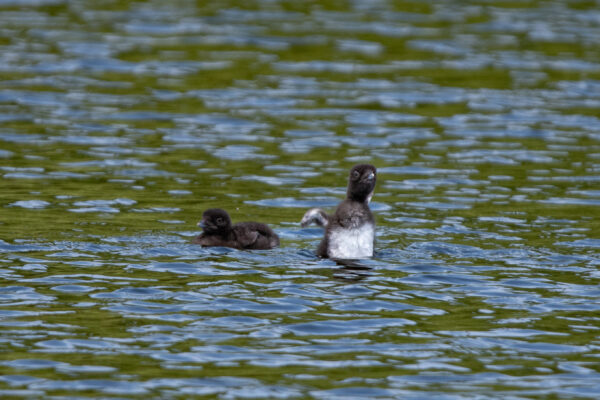Forest Service updates BWCA food storage rules, enforcing $50 fine
Superior National Forest officials announced on Monday, May 6, an update to a forest order for the Boundary Waters Canoe Area Wilderness (BWCAW) requiring that all food, food containers, and scented items be safely stored to help prevent bear-human interactions.
The updated forest order created a stir in online communities and various media outlets.
“In a lot of ways, things haven’t really changed,” Cathy Quinn, the Superior National Forest acting wilderness program manager, said.
The updated forest order, which has been a long-standing BWCAW best practice to maintain wilderness character and avoid bear habituation, is slightly different in that it is now enforceable and results in a $50 fine.
Quinn said the fine is not $5000 and/or six months in jail, as headlines and online chatter have speculated. “Despite what a lot of people have focused on, unfortunately, early on in this media campaign about the food storage order, it’s a $50 fine.”
Forest order 09-09-24-02 mandates that all food and scented items must be suspended at least 12 feet in the air and 6 feet horizontally from the trunk of a tree or stored in an Interagency Grizzly Bear Committee-certified bear-resistant container, excluding times of preparation, consumption, or on-site visual observance.
The forest order is in effect from Mar. 1 to Nov. 30 each year. The restrictions apply to all visitors to the BWCAW unless individuals have written authorization explicitly exempting them from this order or they are carrying out their official duties as members of a rescue or firefighting team. Attractants do not need to be safely stored if they’re being used for cooking or preparing food.
“By law, we are mandated to manage specifically for wilderness character,” Quinn said. “So when we start having bear and human interactions as the result of human behavior, we’re crossing a line that we really don’t want to cross.”
Quinn said the updated forest order ultimately preserves wilderness character and protects bears.
The now enforceable BWCAW food storage-related forest order falls underneath the numerous other rules and regulations enforced within the 1 million acre wilderness area, including prohibited use of fireworks, metal detectors, cans, and glass bottles, transporting wood from out of state, cutting live vegetation, and improper disposal of fish remains. All of which the Forest Service states are enforceable with a maximum penalty of $5,000 and/or six months in jail, a maximum ceiling established by Congress for infractions within a wilderness area.
Quinn said she has worked for the U.S. Forest Service for nearly 30 years and has never “heard of anyone being cited for something as minor as what we’re talking about here.”
“I think people need to just really get past that and focus on what we’re actually trying to do and, again, prevent bear-human interactions,” Quinn said. “For the sake of bears, for the sake of wilderness character, and for public safety as well.”
The updated forest order follows an increase in bear reports in the BWCAW, particularly in the last four years, when visitation during the COVID-19 pandemic also increased. Quinn said Superior National Forest officials have recorded dozens of reports in recent years. “I would say, yes, bear-human interactions are on the rise.”
During the summer of 2022, warning notices about bears were posted at several BWCAW entry points, including Lizz & Swamp Lakes, Meeds Lake, East Bearskin Lake, Daniels Lake, Duncan Lake, Clearwater Lake, and South Lake where bear-human related problems had occurred.
Superior National Forest Wildlife Biologist Cheron Ferland said in the press release, “Once a bear is ‘rewarded’ with human food or garbage, it is likely to become habituated and continue the behavior, which could ultimately lead to the bear being dispatched.”
With BWCAW bear-human interactions and incident reports likely increasing due to improper food storage, the Superior National Forest decided to implement a proactive and preventative approach. Although the updated forest order is in effect, the Forest Service stated that it will primarily focus on education rather than writing a ticket this summer.
“It’s going to take time,” Quinn said. “People don’t have necessarily the right equipment to comply, they may not have the skill set to comply. So we recognize it’s going to be a slow transition.”
WTIP’s Kalli Hawkins spoke with Cathy Quinn, the Superior National Forest acting wilderness program manager, about the updated forest order following the May 6 press release. The audio from the interview is below.














